Conference 2011: Skills, Freelancing, Education, Practice
Page owner: Conference director
Reports from the 2011 conference at St Catherine's College
- Whitcombe Lecture: No more sitting with Nellie: Angus Phillips
- After-dinner talk: In the beginning was the typo … David Crystal
Seminars
- The changing face of journals publishing – are things that different? Al Troyano, Wiley-Blackwell
- Copy-editing considerations for digital media: Mark Knowles, Oxford University Press
- The current state of epublishing: Henry Volans, Faber Digital
Workshops
- Editing fiction: Imogen Olsen
- Last but not least: the index: Ann Kingdom
- Rewriting: Christine Lindop
- Keep on keeping on: Melanie Thompson
- Searching the web more efficiently: Shena Deuchars
- References demystified: Lawrence Osborn
- Managing the stresses, strains, sighs and screams of working as a freelancer: Annette Honeywell and Hania Porucznik
- Refreshed, motivated, enthused: Catherine Booth
These edited articles first appeared in the conference supplement of the November/December 2011 issue of Editing Matters.
Whitcombe Lecture: No more sitting with Nellie
Angus Phillips, director of the Oxford International Centre for Publishing Studies
Reported by Dick Hill
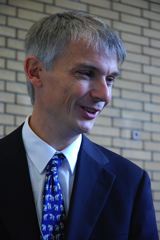
Angus Phillips
This lecture was an overview of the evolution, present state and likely future of publishing education and, by natural extension, of the whole of publishing. It was structured on four considerations:
- how publishing has changed over recent years
- the making of publishing itself into an academic discipline
- the impact and 'boundary changes' arising not just from new media but also from business practice and cost containment
- where is this all leading?
The title, 'Sitting with Nellie', referred to the way in which editing was taught when Angus Phillips first entered the profession in the 1980s. He was instructed in the rudiments by sitting next to his boss, who worked at a cluttered desk with a dog sleeping at her feet.
A growth in courses
Although there is something to be said for this sort of apprenticeship, it increasingly and inevitably became professionalised, and there has been a growth in courses and academic education, particularly over the last ten years. Most of these courses have been developed in the UK, still seen as a world leader. This has had the effect of widening the demographic of those entering the profession. There are, as would be expected, training courses, but there are, as well, more purely academic courses, with links to publishing studies, book history, creative writing, research and library information science.
A number of books have been published in this field, such as John B Thompson's The Merchants of Culture (2010), which Angus particularly recommended. Publishing courses and training now have to cover not just key-skill needs (Adobe, Dreamweaver, XML) but also transferable-skill needs: team working, communications and presentation, working with international units. The first PhDs are starting to roll out.
Inevitable worries
This is an exciting (or daunting) time to be practising or teaching in publishing. Printed media still lead the way, but the pace of transition to alternative media is fast. New terminology has arisen. There is, of course, the 'ebook', but its existence created a need for a term to describe the traditional printed book – hence (you guessed it) the 'pbook'. There is also the 'mook' – a book/magazine combination.
Inevitably there are worries about the future. Higher university fees could affect diversity. Student debt will be exacerbated by low entry salaries. There are risks around work experience, which is necessary but must not be allowed to be a source of cheap (or free) labour.
And, as ever, the endless battle between cost and quality.
After-dinner talk: In the beginning was the typo …
David Crystal, honorary vice-president of the SfEP
Reported by Averill Buchanan
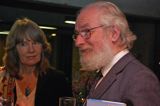
Hilary and David Crystal
To celebrate the SfEP's 22nd annual conference and, by coincidence, the 10th anniversary of the European Day of Languages, David Crystal gave an enlightening and often hilarious after-dinner speech on typos.
He focused on the King James Bible, which this year celebrates its 400th anniversary, and delighted us by cataloguing some of best-known mistakes that have plagued various editions since 1611. The 'Sin On' Bible (1716), for example, suggested that its readers 'Go and sin on more' (sin no more).
Perhaps the most amusing biblical typos are ones where an important word has been omitted. The 1653 edition stated that the 'unrighteous shall inherit the earth' ('… shall not inherit …'), while the Wicked Bible of 1631 radically altered one of the commandments to 'Thou shalt commit adultery'!
Perils of misspelling 'public'
David went on to ponder the subtle psychological reasons behind typos and recalled the phenomenon of the 'typo gremlin' that prevailed when he and colleagues were working on the Cambridge Encyclopedia. What had been perfect copy the night before became typo-riddled by the morning, often to humorous effect. So the star of the movie The Godfather became Robert de Biro; Beethoven was handicapped by deadness; Mike Oldfield recorded the album Tubular Balls; and everyone is surely familiar with the perils of misspelling 'public'.
David recommended The Great Typo Hunt by Deck and Herson, which charts the authors' mission, armed with markers and Tipp-Ex, to correct the typos they encountered on a journey across America. But as we all know very well, even the experts are not immune: 50 copies of David's own book Begat refer on the back cover to the Kind James Bible – the rest were pulped after the error was spotted.
In the beginning was the typo, David said to rapturous applause, and in the end, too.
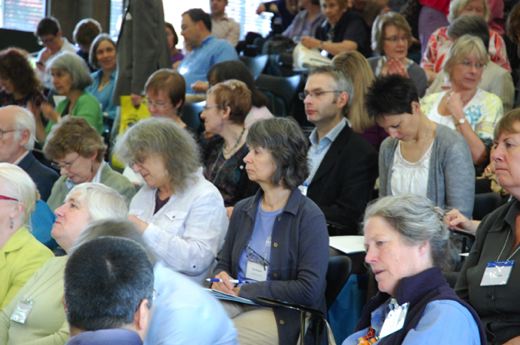
Seminars
The changing face of journals publishing – are things that different?
Al Troyano, Wiley-Blackwell
Reported by Jane Hoyle
Al Troyano is responsible for the production of 530 academic journals. He gave us a brief history of journals publishing and outlined some of the challenges faced by publishers today.
There are currently over 20,000 academic journals worldwide, with submissions increasing every year, but the language of output remains primarily English. The explosion in research since the 1980s has increased pressure on the publishing industry, particularly in the sciences, where the time from acceptance to publication is important for authors. Some publishers now aim for a 21-day turnaround, and an online presence is considered essential.
Proofreading hardest hit
With the use of computers and DTP, turnaround time and costs have been radically reduced. However, despite some help from software, it is difficult to decrease the time it takes to read a paper, so the proportion of the budget taken up by copy-editing and proofreading has increased, leading to inevitable cuts in this area. Proofreading has been hardest hit, as fewer errors are introduced at typesetting now that it is no longer done manually.
The move is increasingly towards outsourcing overseas, with pre-editing to automate the more laborious tasks and outsourcers instructed to carry out minimal intervention. More tasks such as proofreading are being pushed on to authors. There is also pressure on publishers to 'add value' to their online publications, such as hyperlinks, although this comes at a cost.
The growth in research means an increase in the number of publications – the challenge for freelancers will be to maintain our slice of the work!
Copy-editing considerations for digital media
Mark Knowles, digital development manager, OUP
Reported by Julia Sandford-Cooke
Mark Knowles had to meet two challenges. Not only did he need to engage a lecture theatre full of editors in an unfamiliar and complex technical discussion, but he also had to engage a lecture theatre full of sleepy, overfed editors for the final slot of the conference. He chose the sensible strategy of assuring us of our value by asking: 'Does digital rewrite the rules for copy-editors?' The answer, he insisted, is a decisive 'No!'
It's a matter of redefining our concept of 'the book'. Whether on screen or in print, both formats exist to convey information to the reader. Copy-editing digital content still requires the skill and discipline we apply to printed materials, by intervening to ensure consistency of function, style and structure so that readers can locate the information they need.
A 'granular' approach
Of course, such discipline should be applied from the start, but Mark acknowledged that a 'granular' approach is new to authors and commissioning editors alike. As freedom from the conceptual geography of the printed page is not yet second nature, copy-editors will be in the front line of imposing order on the confusion of cross-platform formatting for the next few years at least.
While this conclusion seemed partly to be a plea for editorial patience from OUP's digital department, Mark's evident enthusiasm for the technical possibilities of single-source, multi-format publications ensured that the lecture theatre full of editors had plenty to consider on their journey home.
The current state of epublishing
Henry Volans, head of digital publishing, Faber & Faber
Reported by Andrew Lewis
It was with trepidation that I approached this seminar. I do not consider myself a chronic technophobe, but I am instinctively wary of new technology. No sooner has some cocksure advocate of a particular device assured me that my future will depend on it than the thing becomes obsolete and something else comes along.
And based on questions from the floor about where, if at all, we freelancers sit in the epublishing world, some SfEP colleagues are of a similar mind.
Intrinsic duality
Henry Volans clearly loves traditional publishing, but he also grasps the complex implications that new technology will have for the industry. Too canny to make grandiose claims, he stressed that the epublishing story is ongoing: nothing is settled, and it may be that technological advances will never allow things to settle.
General developments to watch include legal relations between publishing territories, digital rights management and piracy. The intrinsic duality of ebook publishing was highlighted: the iconoclastic – radical pricing strategies and unorthodox design – sits alongside the conventional: the desire among readers for work presented in the best possible way.
My scepticism as a consumer was certainly overcome. The Solar System and The Waste Land iPad apps are tours de force – several times I levered my jaw off the floor and felt as though I were witnessing a redefinition of the very act of reading. But as a freelancer who might find work in epublishing? Only time will tell.
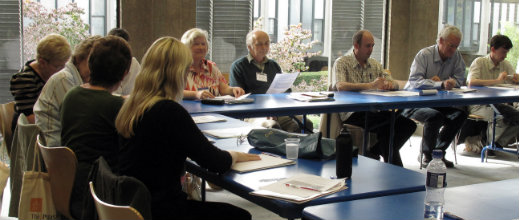
Workshops
Editing fiction
Imogen Olsen
Reported by James Disley
Five full moons in a month? An only child with five sisters? A 14-month pregnancy? What an introduction to the world of fiction editing this workshop turned out to be!
A boom for fiction editors
The interesting and at times lively session introduced a mainly novice audience to the many pitfalls of this rapidly changing field. The workshop leader Imogen Olsen shared her experience as a crime-fiction specialist and discussed the many changes affecting the fiction-publishing arena. It was made very clear that the rise of self-publishing has created something of a boom for fiction editors happy to work with individual clients, but there was little consensus on whether this was, in fact, a good or a bad thing.
One of the most stimulating aspects of this workshop for the majority of participants, given the widespread inexperience in this field, was the advice given by fellow participants already forging successful paths. Various roles were outlined – literary therapist, editorial consultant, book doctor and the like – alongside the more traditional but seemingly rare positions of editors working within publishers. These contributions provided a good counterpoint to Imogen's own background and made for a vibrant atmosphere.
Worthwhile
All in all, this was a worthwhile workshop with a good focus on the changing landscape of the business, and the list of resources Imogen provided was invaluable. Anyone who felt they could spot another full moon, a few days after the last, would certainly have been given plenty of food for thought.
Last but not least: the index
Ann Kingdom
Reported by Sabine Citron
This workshop could have been called 'What you've always wanted to know about the index but were afraid to ask (because don't some people regard indexing as even less cool than editing?)'. The session provided a very comprehensive introduction to the secrets of indexing.
The guru of indexing, Ann Kingdom, presented the task from the point of view of indexers, but also aimed to give proofreaders and commissioning editors a better understanding of the issues involved. The first half of the workshop was devoted to methodology: selection process, features of a good index (and a bad one), briefing indexers, and how to become a professional indexer. We also found out how indexing is adapting to formats such as proprietary XML.
Infectious enthusiasm
The second half of the workshop was a practical demonstration of the magical software now available to indexers. This demo could have been sexed up a little, but it did show that, while the job of the human indexer has become less tedious through automation, it remains absolutely essential.
Ann's enthusiasm for her job is obvious, and infectious – although she could possibly have gone into a little less detail and allowed for a little more interaction. I came away wanting to find out (even) more.
Rewriting
Christine Lindop
Reported by Robert Bullard
My heart sank as the workshop approached. We were going to be static, in just one session, rather than being able to move around as we had done that morning. The workshop was for 2.5 hours, and I had to stay to the bitter end to write it up! But Christine Lindop's relaxed and friendly style – starting with an icebreaker where we summarised a book in one sentence and then invited others to guess its title – quickly put us at ease. Our gaiety was soon audible to the workshop next door.
We started by looking at the reasons for rewriting and explored possible solutions to issues that arise. For example, how far should one go: is it their content or yours? Then, working in threes, we spent an hour rewriting/editing some grisly looking texts and, after a well-earned tea break, shared our reasoning and improvements with others. (The examples were from the Why Edit? part of this website.)
Confidence building
Like the conference as a whole, I didn't learn anything earth shattering, but it was fun meeting people and working together, interesting to hear one another's experiences, and reassuring and confidence building for those who work alone.
Christine kept us well supplied with handouts throughout, and she concluded with some rewriting principles and further resources. Learner English by Michael Swan and Bernard Smith (Cambridge Handbooks, 2001) caught my eye. Aimed at teachers but sure to be of interest to a wider audience, it helps us understand the difficulties of speaking and writing in English, with a chapter-by-chapter study from the perspective of over 30 mother tongues. On to the Christmas list?
Keep on keeping on
Melanie Thompson
Reported by Robin Kirkley
'Hi, I'm Robin and I'm a web writer, editor and proofreader. I'm a new member of the Society for Editors and Proofreaders, but quite experienced as a writer, having been a professional copywriter for many years.'
Elevator pitch
I had no idea that this was my 'elevator pitch' before I took part in Melanie's inspiring and highly interactive workshop (go to the ReadWriteWeb website and search for 'Art of the elevator pitch'). We only get a matter of seconds to make a good first impression – as long as it takes a lift to go a couple of floors – so be prepared.
And 'Keep on keeping on' was full of such surprises. We first considered 'the good, the bad and the ugly' of life as a freelancer, and then we looked at ourselves as a brand.
To avoid getting stuck in a rut, Melanie encouraged us to:
- network so we meet other people and keep refreshed
- maintain an up-to-date list of both our good and bad experiences as a way to remain confident in our abilities
- keep developing ourselves so we don't go stale
- blow our own trumpet
- get to know ourselves better (e.g. check out the Personality Test Center)
- set goals for one, five and ten years ahead and keep working towards them
- continue studying and qualifying.
Working in isolation as freelancers, we've got constantly to find ways to reward ourselves so we remain cheerful and optimistic. Melanie's workshop certainly gave me the boost I needed to keep on keeping on.
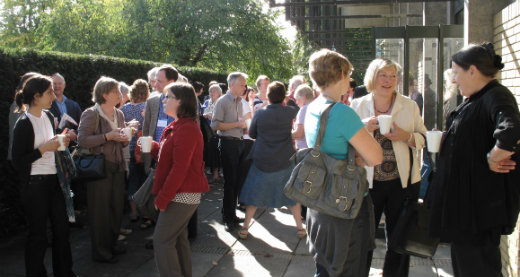
Searching the web more efficiently
Shena Deuchars
Reported by Isabel Willerton
The workshop began with a lively discussion of which search engines we use, what's most irritating about them, what we liked about them and if there were any specific problems in using them. As Shena chaired the feedback, it quickly became clear that the majority of us were committed users of Google and all of us were keen to develop more effective ways of accessing information, verifying its reliability and getting to that point more quickly.
According to Shena, a recent survey had shown that 90.8% of people use Google but she also gave us examples of other search engines we could try. These included:
- Zuula.com (a new one for me), a meta-search engine that shows results in named tabs
- DuckDuckGo.com, which returns effective and intelligent results
- Yippy.com for when you're searching for more obscure content.
Extensive experience
The second half of the workshop concentrated on using the advanced search facility of Google. We covered how to use quotation marks, and the minus symbol to exclude items; how to specify file types; and how to use * as a wildcard. Shena had created a web page specially for the workshop, with links to useful hubs and directories and specialised search engines. She also highlighted some of the pitfalls of using particular search engines. There were suggestions of sites to go to when trying to resolve technical problems and checking references.
Shena's extensive experience meant she provided a really helpful workshop that allowed plenty of group contribution. I came away feeling much more confident in my approach to using the web.
References demystified
Lawrence Osborn
Reported by Ben Kennington
'And roughly how many references?' I usually ask this casually when pricing a job, concealing my underlying trepidation.
Dr Osborn (aka Lawrence, our greatly appreciated conference director) catered for delegates intimidated by these little beasts, whose peculiarity is the unpalatable time-per-word burden that they carry. He's well qualified, with three decades of academic reference-editing experience.
The raison-d'être of references
While not promising to speed up the process (although approving of The Editorium and ReferenceChecker), Lawrence sought, by patient explanation of principle and practice, to allay our fears. First, the raison-d'être of references: to document sources clearly and concisely, enabling the reader to check evidence and follow an argument.
He distinguished between a bibliography and a reference list, and discussed which elements are essential, looking at the short title, Harvard and (concise but obscure) Vancouver systems, and variants (e.g. APA). Much time was spent unearthing problems by examining unedited lists. Personally I would have liked the corrected versions distributed too (this has now been organised). The newest subspecies is the web reference: alongside an URL, the date accessed is helpful.
'A feeling for these things'
Recommended for online checking were the British Library, Library of Congress, WorldCat and Google Books ‐ plus everyone's 'fave' resource, SfEPLine! But Lawrence's oft-repeated advice was: 'Go back to the author.'
'Over the years you build up a feeling for these things,' explained Lawrence, but I would have relished more guidance on how to set about taming a disorderly reference list ‐ what to do in what order. Perhaps one more quote is apposite: 'There are no easy answers.'
Managing the stresses, strains, sighs and screams of working as a freelancer
Annette Honeywell and Hania Porucznik
Reported by Sally Daniell
The ice-breaker had delegates conferring with neighbours about the key causes of stress, committing them to Post-It notes and sticking them to the wall. Then each of us endorsed the suggestions with little red stickers. The top three were, unsurprisingly, work‐life balance, time management, and juggling deadlines. Many more brought verbal endorsements: clearly we all had the same hymn-sheet.
Next question: where on your body do you feel this stress? We each drew a Morph-like body (mine regrettably suggesting the Elephant Man down one side, a famine victim on the other). Then we pointed to the vulnerable areas: initially the head and neck, but with encouragement Morph soon resembled a field casualty.
Meandering through meadows and forests
Fight, flight or freeze? How do we deal with all this fear and gore? We discussed the things we already do (or could do) for relief, mainly on the theme of exercise, and then got down to some practical relaxation techniques, including meditation.
Annette and Hania's mellifluous voices brought us almost to stasis, while our minds meandered through meadows and forests, absorbing beauty and light, before returning to the room, all Zenned out.
This workshop did not teach me how to organise my work life, which I had hoped, but it did tell me I'm on the right track, that saying 'No' is good, and how to use meditation to help combat those familiar panicky feelings. It was undoubtedly relaxing.
As I floated over to lunch, a thought struck me: why were there no men at the workshop?
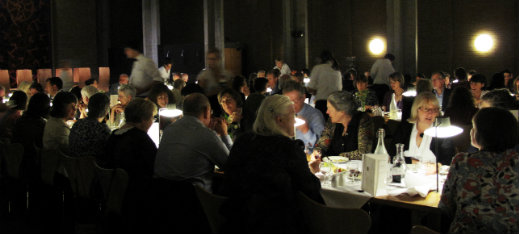
The conference banquet
And finally …
Refreshed, motivated, enthused
Catherine Booth
This was my first conference, and as such I approached the event with some trepidation. What are other editors like in the flesh? I wondered. Will everyone have a hunched back due to hours at the computer, ink stains on their hands and smell faintly of cat? Will they correct my grammar when I speak? Will they be able to hold a conversation after all those solitary hours in a home office? Will there be any – gasp – men?!
Had I not felt obliged to attend as a council member, these fears might have led me to avoid the conference altogether. As it was, I found myself on my way to Oxford on a Sunday afternoon, a time when I usually read the weekend paper, drink tea and eat cake.
Genuine opportunity
There was no reason for my nerves. I was greeted at the registration desk with cheery smiles from Helen and Bridget from the SfEP office. After picking up my name badge, it was off to the AGM.
As well as being my first SfEP conference, this was my first-ever AGM within any society. Although I had nothing to compare it to, attendance seemed strong and the members seemed interested and engaged – a number of questions were asked and answered, with the council promising to get back to people on others. It seems as if the AGM presents a genuine opportunity for SfEP members to voice their opinions on the running of the Society, knowing any concerns will be heard and addressed.
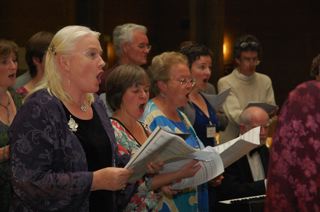
The Linnets in full voice
Highlight The SfEP Linnets were simply marvellous. I have to admit I'd expected a slightly rag-tag bunch of singers – people who could hold a tune, but certainly nothing special – and choirs aren't really my 'thing' (I listen to 6 Music, not Radio 3). But wow, they were amazing!
Low point The lack of a full-length mirror in my room meant more guesswork than I like in dressing for the Monday night banquet. Was my dress too short? Maybe – female editors seem to favour the maxi!
Straight-backed, ink-stain-free and beautifully scented
The AGM was followed by something I'm sure we were all ready for – dinner. Bearing in mind my fears, only some of which are described above, this was one of the occasions I was worried about. Would I know anyone? Well, I knew a few people from my council role. Would I sit by anyone I knew? No, no one was in sight. But did it matter? Again, no! Conversation was easy and engaging.
Where were people from? What did they do? How was business? What were they looking forward to at the conference? We were all in the same situation, and I enjoyed some engaging conversations with delightful people – all of whom were straight-backed, ink-stain-free and beautifully scented. Some were even men, and if I made any grammatical errors, people were too polite to mention them.
The conference proper
The following day brought the start of the conference proper, with the Whitcombe Lecture followed by various sessions and workshops. All of the sessions I attended throughout the two days provided opportunities for editors and proofreaders to interact with the speaker and with each other. Questions were welcomed, discussed and answered.
Being in the company of other editors and participating in training was a refreshing experience for those of us who spend most of the day in solitary confinement. I came away motivated by the things I'd learnt and eager to put them into practice.
Free drink
Overall, the conference revitalised me. I love the freelance life, but it can be isolating. SfEPLine offers a collegiality that I'd otherwise miss, but actually going somewhere new, meeting people, putting faces to names and investing in my CPD (continuing professional development) left me enthused about the society we all belong to and keen to get back to work and make use of my new knowledge.
As I said at the beginning, had I not been a council member, my fear of the unknown may have led me to avoid the conference altogether. That would have been my loss. I would encourage any who feel similarly to screw up their courage and head to York next year!
